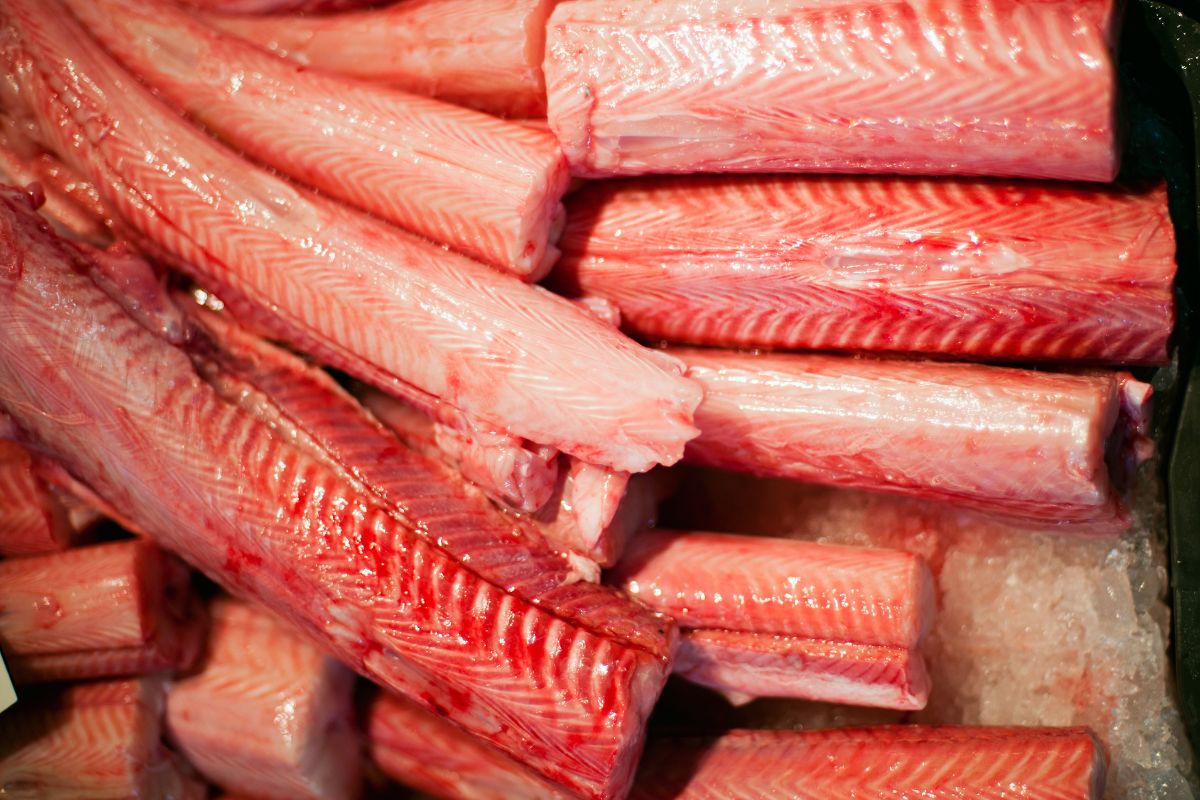Around the world, there are certain culinary traditions and dishes that are considered widely controversial – but which remain widely consumed delicacies in their respective regions.
One such example is shark meat – a dish that has been criticized by wildlife experts and the media alike. However, the dish is still served, and considered to have numerous benefits all around the world.

But what exactly does shark meat taste like, and exactly how safe is it?
What Does It Taste Like?
While resembling tuna in physical appearance, shark meat has been widely reported to be sweet and tender – reminiscent of a combination of fish and crustaceans in terms of texture and taste.
While the taste is not described as being wildly different from other kinds of fish, the dish still remains popular around the world.
Does It Taste Nice?
One thing that proponents of the meat have made clear is that, like most forms of fish and meat, the deliciousness of shark meat depends entirely on how it is prepared, and what it is combined with.
This means that it has the potential to either be extremely delicious and appetizing, or bland and uninteresting.
Does It Need To Be Treated?
Storage and preparation are two important things when it comes to shark meat.
This is because as the shark decomposes, the body produces a high level of urea – something that can give it an unpleasant smell or ammonia or urine if it is not quickly treated and stored correctly.
Some common methods include soaking the meat in lemon juice, vinegar, milk, or saltwater to remove the smell and sour taste.
Other methods include slicing the meat into steaks and filets before the process of decomposition proceeds too far along.
Is Shark Meat Consumption Common?
Despite the controversy surrounding the consumption of sharks, there are many species of shark that are widely fished and consumed all around the world.
Some species include mako sharks, porbeagles, requiem sharks, and thresher sharks – although there are numerous others.
The meat is not only considered a delicacy, but also nutritious – making it a good choice of protein for many cultures around the world, not to mention a fish that has been hunted and consumed since at least the Bronze Age.
What Countries Consume Shark Meat?
As mentioned, there are numerous countries around the world where shark meat is widely consumed – acting as a main source of protein and nutrients for many.
Africa
Shark meat has been consumed on the continent of Africa for centuries – primarily in the coastal regions (as you might well expect).
Common methods of keeping shark meat fresh involved coating it in salt – a common practice for all manner of meats around the world at this time, and a necessity prior to the invention of the refrigerator.
Asia
One of the most prominent consumers of shark meat is the continent of Asia, where they have long been hunted and consumed for their meat.
One of the most prominent Asian countries that is involved in the shark meat trade is Japan – where the dish remains a popular delicacy served in all manner of cuisines, namely sushi.
Some other dishes include fish sausages, surimi, fish sauce, fish paste, and numerous other products.
Shark meat is also widely consumed throughout the country of South Korea – especially the North Gyeongsang Province, where it is a delicacy eaten around specific holidays.
Shark meat is also consumed in Yemen, usually served dried and salted throughout the Hadramout Province.
Australia
Australia has a reputation for being rife with sharks, so you can imagine that it is quite the delicacy in the country.
The most popular species of shark consumed in the country is the gummy shark – a smaller bottom feeding shark found throughout the country’s waters.
In Australia, shark meat is commonly referred to as ‘flake’, and is a commonly found food in the country’s fish and chip shops.
Europe
Europe might not have a reputation for consuming sharks – at least not to the same degree as the other countries on this list – but there are still several locations where the meat is still widely consumed.
One such country is Iceland, where the meat is often fermented and salted before being eaten. To begin the fermentation process, the shark is often buried, and the meat cured, before it is then hung to dry for extended periods.
Another, perhaps surprising, country is Italy – specifically the island of Sardinia – where the meat is consumed regularly as a form of antipasto.
This is generally a species called the catshark, although other less commonplace sharks include the common smooth-hound.
Through France, Germany, and Eastern Europe, it is also common for people to consume a species of shark known as the dogfish – although this tradition has dwindled somewhat in recent decades.

Is Shark Meat Unhealthy?
This might come as a surprise to many people, but shark meat is actually not considered healthy for human consumption.
This is due to a couple of reasons – both of which are worth bearing in mind if you come into contact with shark meat on a regular basis.
Heavy Metals
One of the main reasons why shark meat is generally considered unhealthy is that they come into contact with heavy metals – substances that can cause many health problems when consumed by humans over extended periods.
The main reason for this negative trait is that sharks consume large quantities of these toxic substances from the environments in which they live, as well as the prey they consume.
These can be man made chemicals that have been dumped into the oceans, as well as naturally occurring toxins and substances found around the world.
Urea Levels
As mentioned, shark meat can contain large amounts of a substance called urea – caused during the decomposition process – which causes an ammonia smell and taste.
There have been many studies into this fact, and some scientists consider the levels of ammonia within the fish to be dangerous for human consumption.
Sharks contain high levels of urea because they are carnivorous, and if humans possessed the same levels our kidneys would be damaged beyond repair and we would die.
While trained chefs can mask the taste and smell with other ingredients, they can never truly remove it from the flesh – making it a potential danger for regular consumers.
Arsenic Content
Several species of sharks have also been found to contain elevated, dangerous levels of arsenic within their meat.
As many people may know, arsenic is a naturally occurring and highly poisonous substance that has long been used as a poison amongst humans.
This high content within the sharks is also transferred to the meat, meaning that those who regularly consume shark meat put themselves at risk of potential arsenic poisoning.
Lead Content
Some species of sharks have also been discovered to contain high levels of lead in their meat – making them extremely dangerous for humans who regularly consume the meat.
Lead has long been a dangerous substance, and one that has killed many humans throughout history, and as such this is another worry for those studying shark meat and the impact it could have.
Mercury Content
Shark meat has also been found to contain higher amounts of mercury than other species of fish, and as many people may know, mercury and humans do not mix.
Exposure to mercury can cause headaches, tremors, cognitive impairment – making it extremely dangerous to humans in large quantities.
What Other Downsides Are There?
As well as being unhealthy and potentially dangerous for human consumption, there are other notable downsides to the shark meat trade.
Harmful To Environment
The main downside to the shark meat trade is the damage that it causes to the environment – specifically the underwater habitats where sharks can be found.
With the increased fishing of sharks throughout the world, one of the major changes has been a rise in the presence of toxic algae.
In a normally functioning ecosystem, the sharks feed on the mid-level predators that hunt herbaceous fish – balancing the ecosystem, and meaning that there are still plenty of herbaceous fish to eat the toxic algae.
However, without sharks, there are more mid-level predators, which in turn eat the herbaceous fish, which in turn allows the toxic algae to bloom and thrive freely throughout the oceans.
Final Thoughts
And there we have it, everything you need to know about eating shark meat, what exactly it tastes like, and the nutritional value therein.
It’s true that shark meat is a highly controversial subject, but while taboo in the western world, the dish is still consumed throughout the eastern world, where it is considered a delicacy in many cultures.
So if you want to learn more about shark meat, or you are just curious about what it tastes like, then be sure to check out this handy guide!
- How To Reheat A Cheesesteak - November 5, 2023
- What Are Three Must Have Kitchen Knives? - September 22, 2023
- How To Protect Edges Of Pie Crust - June 15, 2023








